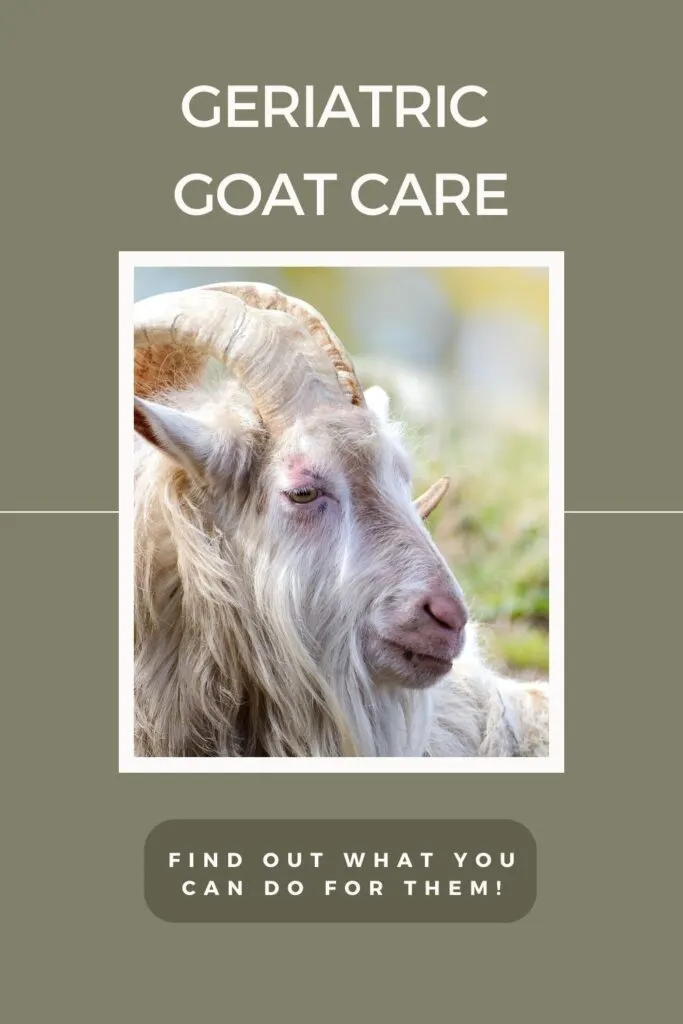Compassionate Care: A Comprehensive Guide to Caring for Geriatric Goats
As goats age, they deserve special attention and care to ensure a comfortable and fulfilling life in their golden years. Geriatric goats, typically those aged eight or ten years and older, may experience age-related challenges that require thoughtful management. In this detailed guide, we’ll explore the essential aspects of caring for geriatric goats, covering nutrition, health monitoring, shelter considerations, and overall well-being.
How long do goats typically live? Find out here: Goat Lifespan
1. Tailored Nutrition: Meeting the Unique Needs of Senior Goats
a. Balanced Diet:
- Provide a well-balanced diet that meets the specific nutritional requirements of geriatric goats.
- Adjust the diet based on individual health conditions, activity levels, and dental health.
- Find out what to feed a goat here: Goat Feed Requirements and What should a goat eat? and Understanding goat feeding terms.
b. Easy-to-Chew Forage:
- Offer forage options that are easy for older goats to chew, such as high-quality hay or chopped forage.
- Supplement the diet with senior goat feeds that are designed to address their nutritional needs.
- One way to give them long fiber is to add shredded beet pulp to their pelleted feed. Also giving them black oil sunflower seeds, which is 25% fat) can help them maintain and even gain weight.
c. Adequate Hydration:
- Ensure constant access to clean and fresh water.
- Monitor water intake, as geriatric goats may be prone to dehydration.
d. Thiamine (B-1):
- As goats age, their rumens will produce less thiamine, which is critical for their health. Give regular shots of thiamine to help them maintain the adequate levels needed for health. Not only will the thiamine help with their rumen function, but their brain as well!
- Read more about how to administer Thiamine here.
2. Regular Health Monitoring: Detecting and Addressing Issues Early
a. Routine Veterinary Check-ups:
- Schedule regular veterinary check-ups to assess the overall health of geriatric goats.
- Discuss vaccinations, dental care, and potential age-related issues with the veterinarian.
b. Dental Care:
- Address dental issues by providing regular dental check-ups and changing feed if necessary.
- Modify the diet to accommodate dental challenges, such as offering soaked pellets or senior feeds.
c. Parasite Control:
- Implement a parasite control program tailored to the specific needs of older goats.
- Regularly monitor fecal samples for signs of parasitic infestation.
- Older goat’s immune systems are likely not as strong and can be more prone to parasites. They may need more fecal counts to make sure this isn’t an issue.
- Dewormers don’t always work. The only way you KNOW if they work, is if you do a fecal to check if they did! Get My Parasite Control Plan below:
d. Weight Management:
- Monitor body condition and weight regularly.
- Adjust feeding practices to prevent obesity or malnutrition, which are common issues in geriatric goats.
3. Comfortable Shelter: Protection from the Elements
a. Adequate Bedding:
- Provide soft bedding to alleviate pressure on aging joints.
- Ensure that bedding remains clean and dry to prevent respiratory issues.
b. Temperature Regulation:
- Geriatric goats may struggle with temperature extremes.
- Offer shelter with proper ventilation for cooling in hot weather and protection from cold drafts in winter.
c. Separate Spaces:
- Consider providing separate spaces within the shelter for geriatric goats to avoid competition for food and resting areas.
- Ensure easy access to water and feed.
4. Maintaining Mental and Physical Stimulation:
a. Social Interaction:
- Geriatric goats benefit from social interaction with herd members.
- If separation is necessary due to health concerns, provide visual and auditory contact with the herd.
b. Enrichment Activities:
- Engage geriatric goats in gentle enrichment activities.
- Provide toys, platforms, or access to different areas to stimulate their minds and bodies.
5. Pain Management and Palliative Care:
a. Pain Assessment:
- Monitor for signs of pain, stiffness, or discomfort. Arthritis can become a problem as the goat gets older.
- Consult with a veterinarian to develop a pain management plan if necessary.
b. Palliative Measures:
- Implement palliative care measures to enhance the quality of life.
- Provide soft bedding, administer joint supplements, and explore options for pain relief.
6. The End:
a. Be kind as the end nears. You’ll be able to tell when the end is near and if you need to step in and help the process along. It isn’t kind to keep a goat suffering and in pain or not living a quality of life. They don’t view death like humans do…but they do fear being a burden to the herd or not being able to keep up with them. This might be harder on you than the goat to say goodbye.
Conclusion:
Caring for geriatric goats requires a combination of empathy, vigilant monitoring, and proactive management. By tailoring their nutrition, addressing health issues promptly, ensuring comfortable shelter, maintaining mental and physical stimulation, and implementing pain management strategies when needed, goat caretakers can offer their senior companions a dignified and fulfilling life. Regular communication with a veterinarian, adapting care routines as needed, and fostering a compassionate environment contribute to the well-being and contentment of geriatric goats in their later years.
